By using a VPN, you can significantly enhance the security and anonymity of your online communications, drastically reducing the risk of encountering issues on the Internet. This article delves into how VPN connections operate, why they offer heightened security, and the scenarios where utilizing a VPN is particularly recommended.
How a VPN Enhances Your Internet Security
A VPN, or Virtual Private Network, serves as a secure conduit between your device and the vast world of the internet. A VPN connection enhances the security of your Internet access for the following reasons:
- Your data is encrypted.
- Anonymity is maintained.
When you establish a VPN connection, your data is transformed into a unique code, and the content of the communication is encrypted. Even if intercepted by a third party, encrypted data cannot be easily deciphered. This secure process effectively protects personal information and sensitive data, preserving your privacy.
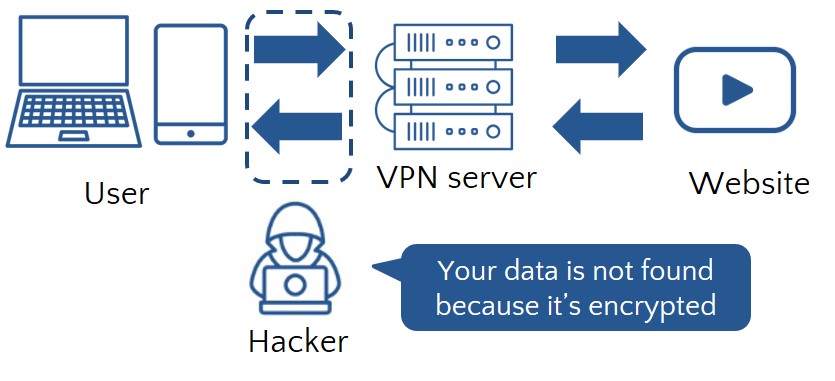
In addition, a VPN connection enables you to conceal your internet location and IP address (your unique identifier on the internet). By hiding your location and IP address, you reduce the risk of identification, thus fostering greater anonymity. This increased anonymity makes it much harder for your online activities to be tracked and traced.
Risks Associated with Not Using a VPN
When you’re not using a VPN for Internet connection, particularly those without a high level of security, the following risks are possible:
- Privacy breaches
- Hacking or unauthorized access
In non-VPN-protected communications, personal information along with online activity and search history may be monitored by third parties.
Furthermore, if you are in a location with high security vulnerabilities and not using a VPN, you become an easy target for hackers and unauthorized access. Hackers might not only steal your personal information, but also obtain passwords, credit card details, and other critical data.
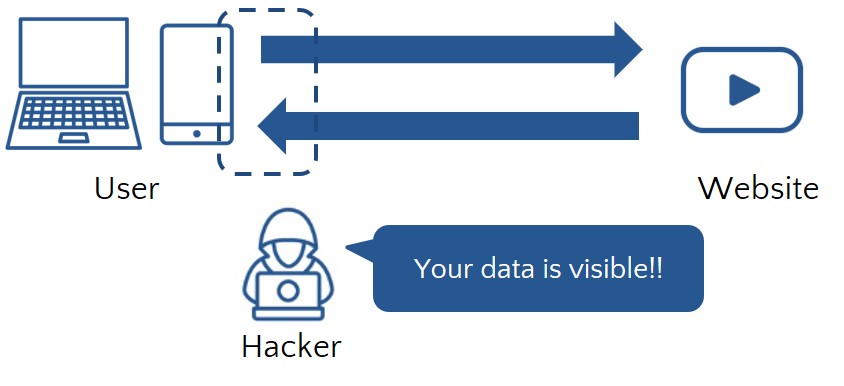
Locations with High Risks Without a VPN Connection
The following are two notable examples of locations that pose high risks when a VPN connection is not in use.
Free Public Wi-Fi
Free Wi-Fi is commonly provided as a service in cafes, airports, libraries, and more. However, given that these free Wi-Fi services are used by an indefinite number of people, the chances of data on the network being intercepted by others are higher. If hackers gain access to this data, they can extract personal and login information from it for misuse. They may even set up fake access points to mimic genuine free Wi-Fi. If you connect to such deceptive Wi-Fi without protection, your personal information can be compromised. Utilizing a VPN can significantly mitigate these risks.
Internet Connections with Lax Security Measures
Not all non-free Wi-Fi connections guarantee perfect security. Even Wi-Fi connections at home and businesses can have lax security measures. With weak security measures, hackers can easily infiltrate the network and steal personal information and important data. A VPN connection can greatly decrease the risk of data interception in these circumstances.
Understanding the Difference Between Wi-Fi and VPN Connections
The distinction between Wi-Fi and a VPN connection lies in the fact that Wi-Fi is a standard for wireless Internet access, while a VPN is a secure communication pathway that works over Wi-Fi or any other form of Internet connection. It’s important to understand that you cannot connect to the Internet using only a VPN.
- Wi-Fi: Wi-Fi represents a standard for wireless connectivity to the Internet, broadly used in homes, schools, cafes, and more. To utilize Wi-Fi, you need a Wi-Fi router, which transmits signals from a communication line connected to the Internet.
- VPN Connection: A VPN, standing for Virtual Private Network, serves as a fortified conduit between your device and the expansive internet. It should be noted that when you use a VPN, you must already be connected to the Internet via Wi-Fi or any other method.
More Than Just Security: Additional Benefits of Using a VPN
Apart from enhancing security, there are several other benefits to using a VPN.
- IP Address Masking and Geographic Location Alterations
- Circumventing Geo-Blocking
IP Address Masking and Geographic Location Alterations
An IP address is a unique identifier that distinguishes your device on the internet or within a local network. It’s a gateway to revealing the location and other pertinent information of visitors to websites and online services. Using a VPN can help mask and modify your IP address.
For instance, on the left below, an IP address accessed via an internet provider in the US is displayed, while on the right, an IP address accessed via a VPN server in Japan is shown. It becomes evident that regardless of your actual location, using a VPN can mask and change your IP address.
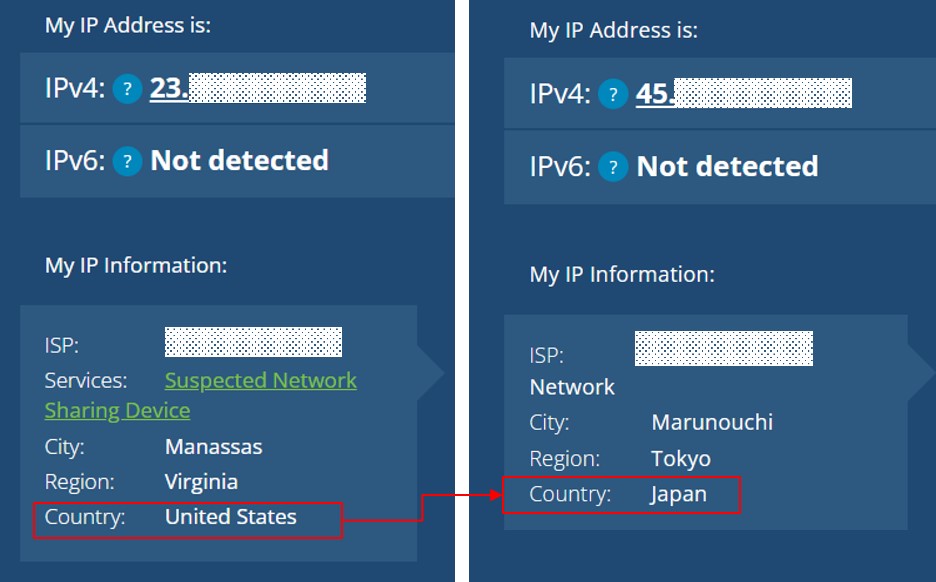
Capitalizing on this feature can yield the following benefits:
- It enables you to subscribe to services like YouTube Premium, Netflix, and other subscription platforms at a discounted rate, accessing them via countries with lower prices. >>Save Money with a VPN
- It allows you to book airline tickets and hotel accommodations at lower costs by routing your traffic through countries that offer these services at lower prices.
Circumventing Geo-Blocking
Another advantage of using a VPN is its ability to bypass geo-blocking. Geo-blocking is a practice of restricting access to content based on a user’s geographic location. It is often employed by governments or service providers.
China, for instance, is well-known for its stringent internet regulations that block access to several social networking sites and other websites. With a VPN, you can access social networking sites and web content even in locations where such access is typically restricted. >> unblock the Web – Streaming with a VPN
How to Set Up a VPN Connection
There are primarily two methods to establish a VPN connection:
- Manually input individual server information, usernames, passwords, and other related VPN details into the settings of your PC or smartphone.
- Download a dedicated application provided by your chosen VPN service.
For most personal users, the easiest way to use a VPN is to download and utilize a dedicated VPN application.
For instance, with ExpressVPN, a highly recommended VPN service, all you have to do is download the app and enter the activation code provided upon registration. After the setup, you can easily select your preferred server by simply opening the app.
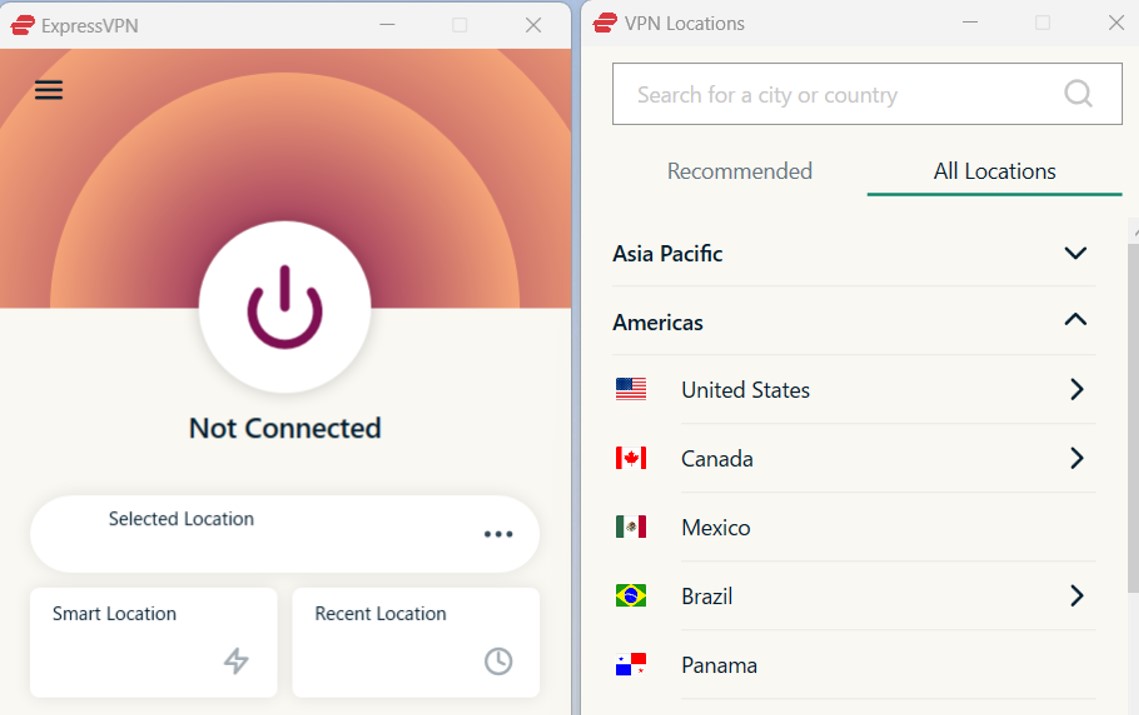
Once you’ve selected a server, simply click (or tap, in the case of a smartphone) to automatically connect to the VPN server.
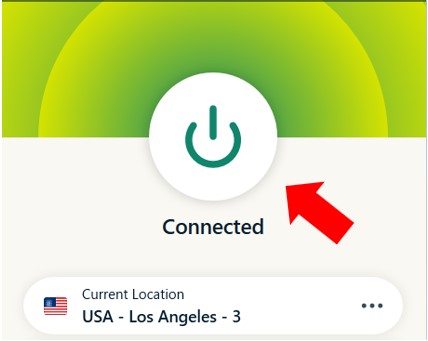
If you want to disconnect from the VPN, simply click (or tap) the power icon in the center again. The process is similar across different VPN services, making it easy for first-time users to utilize a VPN.
- ExpressVPN: Recommended for those who need higher internet speed
>>Sign up through our site get an extra 3 months free! - NordVPN: Recommended for those who want to balance price and internet speed
- SurfShark
 : Recommended for those on a budget
: Recommended for those on a budget
Conclusion
- A VPN connection establishes a dedicated, encrypted communication tunnel, significantly reducing the risk of third parties intercepting and deciphering your data. As such, VPNs are widely utilized to bolster security and ensure anonymity online.
- VPN connections are particularly advisable when using public free Wi-Fi or internet connections with lax security measures. These environments can heighten the risk of communication interception and potential leakage of crucial information such as personal details and payment information.
- Besides bolstering security, VPNs also offer additional benefits such as IP address masking and location alteration, as well as the ability to bypass geo-blocking. These features can facilitate cost-saving on subscription services, enable access to content outside of your geographical location, and offer several other advantageous uses.